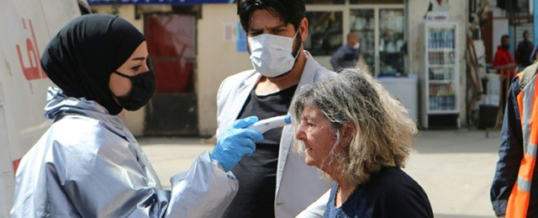
McLeod Group blog, Hunter McGill and Lauchlan T. Munro, June 15, 2020
Amid the masses of reporting on the COVID-19 pandemic, the Canadian media have shown little interest in the consequences of the pandemic in developing countries, especially those already experiencing humanitarian crises. The United Nations humanitarian office (UNOCHA) reported at the beginning of the year – before the global COVID-19 outbreak – that 160 million people would be in need of humanitarian assistance in 2020 and that US$28.8 billion would be required to respond. UNOCHA has since asked for an additional US$7.3 billion, based on the projected impact of COVID-19 on people already living in humanitarian crises. As of June 14, donors have announced contributions amounting to only 18% of the appeals.
When Ebola struck several West African countries in 2014-15, fragile health systems came under severe strain and almost collapsed. Ongoing programs, including immunization and maternal and child health care, were severely compromised. There is evidence that the COVID-19 pandemic is already hurting regular immunization rates around the world, as well as other sectors such as education.
If the virus spreads in refugee and displaced persons’ camps, the consequences will likely be catastrophic. The protective measures of hand-washing and physical distancing are impossible in those environments, where there is rarely any soap and water and no space.
There are also increasing obstacles to the efforts of humanitarian agencies in gaining access to these countries, not least in the form of restrictions on or the almost complete shutdown of international (air) logistics systems. The UN Secretary General’s March 23 appeal for a global ceasefire to allow humanitarian access by relief agencies has yet to receive the support of all five veto-holding permanent members of the Security Council that it needs to pass.
Of particular concern to Canada should be the pandemic’s impact on women in developing countries and in emergency situations, as they are the majority of front-line medical staff and primary care workers. In many cases these women are also heads of households. If and when they are infected with the virus, the impact is even greater.
On March 11 and April 7, the Canadian government announced $159.5 million in funding to fight COVID-19 overseas. Among the recipients of the funds were several UN agencies and the International Red Cross Movement. Some of the money ($30 million) has been earmarked for certain bilateral partner countries.
In a welcome move, Canada will also push for debt relief of the most affected countries. This is an important start, but without more support from Canada and other donor countries, the international humanitarian effort will stutter to a halt and crisis-affected developing countries will become reservoirs for COVID-19.
On May 18, International Development Minister Karina Gould announced the allocation of $306 million to a range of UN agencies and non-governmental organizations, and to the International Red Cross movement. This funding is in response to the regular annual humanitarian appeals for 2020 issued in December 2019. The allocation is of similar size to Canada’s humanitarian response in recent years, which placed us seventh in the list of donor countries in 2018.
In a recent interview, Minister Gould referred to a further pledge of $16.5 million, labelled new money, for women’s rights and food security in African countries affected by COVID-19.
So, what’s wrong with this picture?
First of all, why has it taken five months to provide Canada’s share of the response to the UN’s December 2019 appeal? The COVID crisis cannot be the whole answer, as Canada did not enter crisis mode until March 2020, three months after the joint appeal was launched. It shouldn’t take that long to write a cheque, especially when one knows well ahead of time that the request for money is coming.
Second, it is not at all clear if most of this is new money or just a reallocation within the existing aid budget. If it is the latter, it is a very short-sighted response, as today’s short-term humanitarian results will be bought at the expense of longer-term development or from other humanitarian relief operations. Alas, we have seen this movie before. It is called robbing Peter to pay Paul. Diverting funds from existing programs to combat COVID-19 will diminish Canadian support for Rohingya refugees, food-insecure populations in Kenya, Sudan and Somalia affected by locusts, and the multidimensional humanitarian crisis in Haiti, to name only a few ongoing emergencies.
Third, it is not clear how much of Canada’s COVID-19 aid will flow to important regional institutions, such as the African Centres for Disease Control and Prevention versus how much will flow to the big multilateral agencies and international NGOs, who have less incentive to build local capacity for resilience. Canada must increase its support for strengthening humanitarian response agencies in affected and vulnerable countries, in keeping with its commitment in 2016 at the World Humanitarian Summit.
Fourth, Minister Gould’s latest announcement of $16.5 million in “new money” for women’s rights and food security came just one week before the UN General Assembly votes on Canada’s bid for one of the rotating seats on the UN Security Council. What a coincidence.
Finally, Canada must funnel more money into international cooperation efforts overall, reversing the steady downward trend of the past half decade. There will be those who say “charity begins at home”. Our response should be “but it doesn’t have to end there”. There is an enormous risk that the achievements of recent decades will be lost as humanitarian crises and COVID-19 devastate developing country populations and destroy their growth prospects. Canada can and should do more.
Previously chief of peer reviews at the OECD Development Assistance Committee, Hunter McGill is Senior Fellow at the School of International Development and Global Studies, University of Ottawa. A former international civil servant, Lauchlan T. Munro teaches at the University of Ottawa’s School of International Development and Global Studies. Photo: Refugee camp in Lebanon, AFP.
